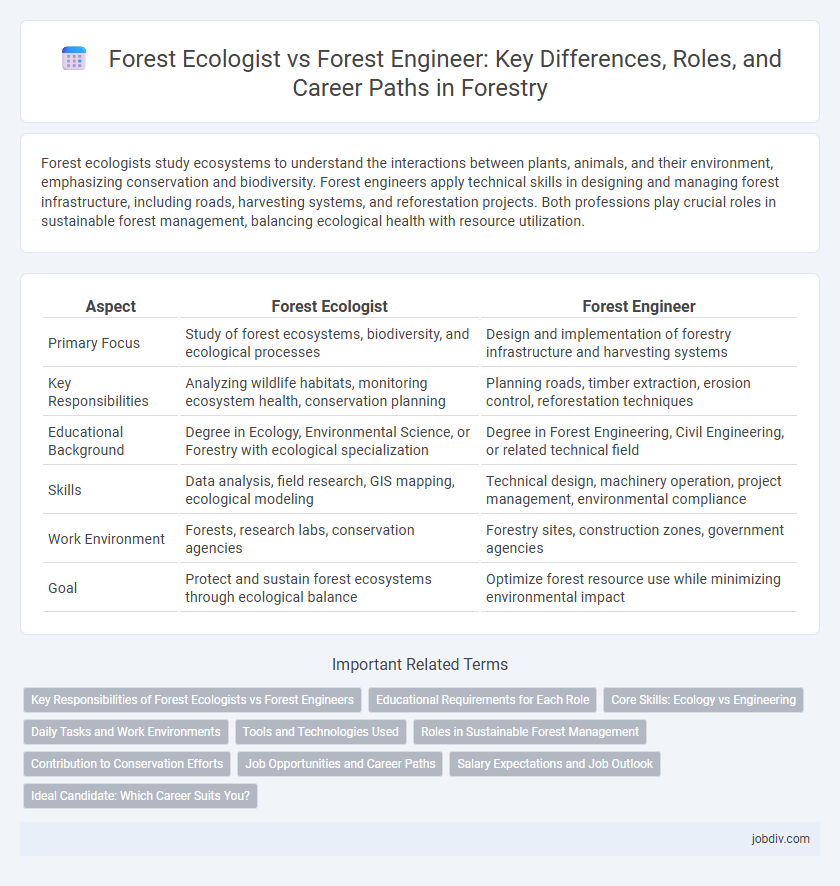Forest ecologists study ecosystems to understand the interactions between plants, animals, and their environment, emphasizing conservation and biodiversity. Forest engineers apply technical skills in designing and managing forest infrastructure, including roads, harvesting systems, and reforestation projects. Both professions play crucial roles in sustainable forest management, balancing ecological health with resource utilization.
Table of Comparison
| Aspect | Forest Ecologist | Forest Engineer |
|---|---|---|
| Primary Focus | Study of forest ecosystems, biodiversity, and ecological processes | Design and implementation of forestry infrastructure and harvesting systems |
| Key Responsibilities | Analyzing wildlife habitats, monitoring ecosystem health, conservation planning | Planning roads, timber extraction, erosion control, reforestation techniques |
| Educational Background | Degree in Ecology, Environmental Science, or Forestry with ecological specialization | Degree in Forest Engineering, Civil Engineering, or related technical field |
| Skills | Data analysis, field research, GIS mapping, ecological modeling | Technical design, machinery operation, project management, environmental compliance |
| Work Environment | Forests, research labs, conservation agencies | Forestry sites, construction zones, government agencies |
| Goal | Protect and sustain forest ecosystems through ecological balance | Optimize forest resource use while minimizing environmental impact |
Key Responsibilities of Forest Ecologists vs Forest Engineers
Forest Ecologists conduct research on forest ecosystems, analyzing biodiversity, soil composition, and ecological impacts to promote sustainable forest management. Forest Engineers design and implement infrastructure for forest operations, including road construction, erosion control, and timber harvesting techniques to optimize resource extraction while minimizing environmental damage. Both roles contribute to sustainable forestry, with ecologists focusing on ecosystem health and engineers emphasizing operational efficiency and environmental protection.
Educational Requirements for Each Role
Forest ecologists typically require a bachelor's degree in ecology, environmental science, or biology, often supplemented by a master's degree specializing in forest ecology or conservation. Forest engineers usually hold a degree in forest engineering or civil engineering with a focus on forestry applications, emphasizing technical skills in planning and managing forest resources. Both roles demand strong foundations in natural sciences, but forest engineers prioritize engineering principles and spatial analysis, while ecologists focus more on biological and ecological processes.
Core Skills: Ecology vs Engineering
Forest ecologists specialize in understanding ecosystem dynamics, biodiversity, and conservation principles, utilizing skills in ecological modeling, habitat assessment, and species interaction analysis. Forest engineers apply principles of civil and environmental engineering to design sustainable forest infrastructure, including road systems, harvest planning, and erosion control techniques. Both disciplines require proficiency in remote sensing and GIS, but ecologists emphasize biological processes while engineers focus on technical problem-solving and resource extraction optimization.
Daily Tasks and Work Environments
Forest ecologists analyze ecosystems, monitor biodiversity, and assess the impact of environmental changes, working primarily in research labs and field sites. Forest engineers design and implement infrastructure such as roads and harvesting equipment, operating mostly in forestry operations and construction zones. Both roles require collaboration with environmental agencies but differ in daily focus on ecological data versus engineering applications.
Tools and Technologies Used
Forest ecologists primarily utilize geographic information systems (GIS), remote sensing technologies, and ecological modeling software to analyze forest ecosystems and biodiversity. Forest engineers employ advanced mechanized equipment, such as harvesters, forwarders, and computer-aided design (CAD) tools, to plan and optimize sustainable forest harvesting and infrastructure development. Both professions leverage drones and GPS technology for precise data collection and forest management.
Roles in Sustainable Forest Management
Forest ecologists analyze ecosystem functions, biodiversity, and the impact of environmental changes to develop strategies that maintain forest health and resilience. Forest engineers design and implement infrastructure and harvesting systems that optimize resource extraction while minimizing ecological disturbance. Both roles collaborate to balance conservation goals with sustainable timber production, ensuring long-term forest sustainability.
Contribution to Conservation Efforts
Forest ecologists contribute to conservation efforts by studying ecosystem dynamics and biodiversity to develop strategies that protect habitats and promote sustainable forest management. Forest engineers play a crucial role by designing and implementing infrastructure and harvesting techniques that minimize environmental impact, supporting conservation goals through efficient resource use. Both disciplines collaborate to ensure forest health and resilience while balancing human and ecological needs.
Job Opportunities and Career Paths
Forest ecologists concentrate on studying forest ecosystems, biodiversity, and environmental impacts, leading to careers in research, conservation, and environmental consulting. Forest engineers focus on designing and managing forest operations, including timber harvesting and road construction, offering job opportunities in forestry management, logging companies, and land development. Both professions have strong growth potential in government agencies, private sector forestry firms, and non-profit environmental organizations.
Salary Expectations and Job Outlook
Forest Ecologists typically earn salaries ranging from $50,000 to $75,000 annually, with job growth driven by environmental conservation and biodiversity research initiatives. Forest Engineers command higher salaries, often between $65,000 and $90,000, reflecting their expertise in forest management, infrastructure development, and sustainable timber harvesting. Job outlook for Forest Engineers remains strong due to increasing demand for efficient resource management and compliance with environmental regulations.
Ideal Candidate: Which Career Suits You?
A forest ecologist is ideal for candidates passionate about studying ecosystem dynamics, biodiversity, and conservation, focusing on research and environmental impact assessments. A forest engineer suits those interested in applying engineering principles to forest management, including road construction, harvesting techniques, and sustainable resource utilization. Both careers require strong analytical skills, but ecologists prioritize ecological balance while engineers emphasize practical solutions in forest operations.
Forest Ecologist vs Forest Engineer Infographic

 jobdiv.com
jobdiv.com